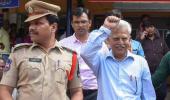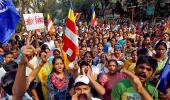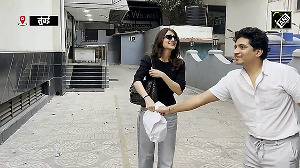Maharashtra police on Tuesday raided the homes of prominent Left-wing activists in several states and arrested at least five of them for suspected Maoist links.
Near simultaneous searches were carried out at the residences of prominent Telugu poet Varavara Rao in Hyderabad, activists Vernon Gonzalves and Arun Farreira in Mumbai, trade union activist Sudha Bhardwaj in Faridabad, and civil liberties activist Gautam Navalakha in New Delhi.
Subsequently, Rao, Bhardwaj and Farreira were arrested. Although Navalakha was also arrested, the Delhi high court ordered police not to take him out of the national capital at least until Wednesday. According to unconfirmed reports, others whose residences were raided are Susan Abraham, Kranthi Tekula, Father Stan Swamy in Ranchi and Anand Teltumbde in Goa.
The raids were carried out as part of a probe into the violence between Dalits and the upper caste Peshwas at Koregaon-Bhima village near Pune after an event called Elgar Parishad, or conclave, on December 31 last year.
Here are their brief profiles:

>> Varavara Rao
Rao has been writing poetry since 1957. Founder member of Virasam (Revolutionary Writers’ Association), he was arrested in October 1973 under the Maintenance of Internal Security Act. He was released and arrested on more than one occasions between 1975 and 1986 in different cases, including the 1986 Ramnagar conspiracy case in which he was acquitted in 2003 after 17 years.
Rao was again arrested on August 19, 2005 under AP Public Security Act and sent to Chanchalguda Central Prison in Hyderabad. The case was struck down under the Public Security Act on March 31, 2006 and Rao obtained bails in all other cases.
>> Arun Ferreira
An activist based in Mumbai, Ferreira was claimed to be the leader of the propaganda and communications wing of the banned Communist Party of India-Maoist in 2007. He was acquitted of all charges in 2014. In his book, Colours of the Cage: A Prison Memoir, published the same year, Ferreira, recounted the details of his imprisonment of nearly five years.
>> Sudha Bharadwaj
Bharadwaj is best known for her work in Chhattisgarh, where she has lived for 29 years and fought for the rights of mine workers in Bhilai, as a member of late Shankar Guha Niyogi’s Chhattisgarh Mukti Morcha.
She began working with the Mukti Morcha in 1986, after witnessing the abysmal working conditions of labourers in West Bengal, Bihar and Uttar Pradesh during her stint as a student in IIT Kanpur. A civil rights activist and lawyer, Bharadwaj has also been fighting against land acquisition, and is currently the general secretary of the Chhattisgarh People’s Union for Civil Liberties.
>> Susan Abraham
Abraham, a civil rights lawyer, represented many of those arrested during the June raids by the police in connection with the Elgar Parishad event. The wife of activist Vernon Gonzalves, Abraham was born in Kerala to schoolteacher parents and studied in Zambia.
She has been part of protests against demonetisation, fake encounters and for workers and women’s rights. She has written extensively against the rigourous sentences given to DelhiUniversity professor G N Saibaba, activist Prashant Rahi among others, calling it a “misuse of the Unlawful Activities (Prevention) Act”. Her name can be seen in the credits of a film, Court, in which she guided filmmaker Chaitanya Tamhane through the intricacies of the law.
>> Vernon Gonzalves
A blog run by his friends describe Vernon Gonzalves as a “leader of the Altar Boys” and “a strong believer of justice, equality & freedom”. A gold medallist from MumbaiUniversity and a former lecturer at RuparelCollege and HR College, Gonzalves, security agencies allege, was an ex-central committee member and former secretary of Maharashtra State Rajya Committee of Naxalites. He was charged in around 20 cases and has been acquitted due to lack of evidence, after serving six years in jail.
>> Gautam Navlakha
Navlakha has been associated with People’s Union for Democratic Rights and is a Delhi-based journalist. He is also an editorial consultant of the Economic and Political Weekly.
He, along with Sudha Bharadwaj, demanded repeal of the Unlawful Activities (Prevention) Act, 1967. They said, the Act, passed to regulate the activities of unlawful organisations, has been used by the government to curb extremist activities as opposed to unlawful activities.
Navlakha, a frequent traveller to KashmirValley for the last two decades, has also written extensively about alleged human rights violations in Jammu and Kashmir.
>> Anand Teltumbde
An engineer, MBA and former CEO, Teltumbde is also a leading scholar and activist for Dalit rights. He has authored books on people’s movement particularly about leftist agitations and Dalit rights struggles. He also has a doctorate in cybernetics from MumbaiUniversity. It is no coincidence that he has often argued that reservation for Dalits has, in fact, stigmatised them and consecrated caste in India’s polity.
>> Father Stan Swamy
Human rights activist father Stan Swamy founded the Vistapan Virodhi Janvikash Andolan, a platform that advocates the rights of indigenous people including Adivasis and Dalits. Swamy was among the 20 people against whom a sedition case was filed in July this year, for posting statements against the Jharkhand government for inciting tension over the Pathalgadi movement.
>> Kranthi Tekula
Tekula is a journalist with Namaste Telangana.











 © 2025
© 2025